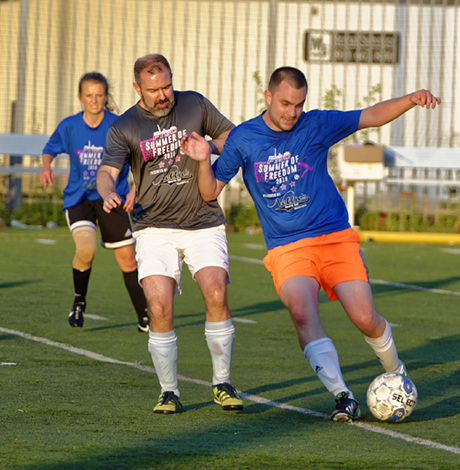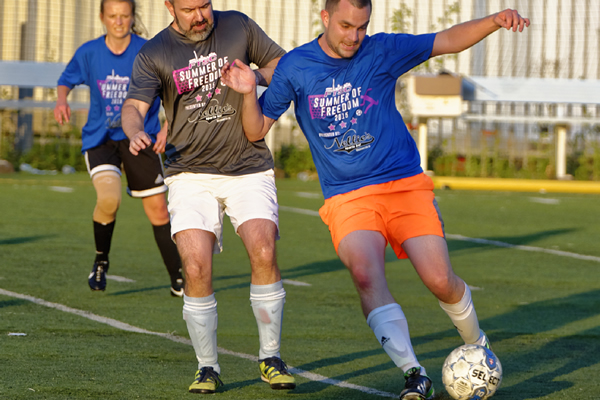Sports
Tensions sometimes flare when gay sports leagues mix with straight
Heat-of-the-moment slur from straight opponent raises ire of Federal Triangles leaders


The Federal Triangles players in action. (Photo by Glenn Auve)
Homophobic slurs have been a long-running situation in the sports community and they continue to happen despite the progress of the LGBT sports movement. The comments are tossed at seemingly anyone and often come in the heat of a sporting event. The slurs can be sexist, racist, homophobic, transphobic or aimed at anyone who is considered inferior.
The question then becomes, is it OK if the person using the slur apologizes? Does it become a teaching moment?
The Federal Triangles Soccer Club is a long-running LGBT-based soccer club in the Washington area. During the summer season, members run their own league, the Summer of Freedom League. It’s considered a safe space for LGBT players and allies.
During the other three seasons, members of the Federal Triangles are on teams that play in predominately straight soccer leagues in the area. The leagues can consist of either women’s, men’s or co-ed teams.
District Sports is a straight-based nonprofit that provides recreational leagues and tournaments to about 6,300 athletes at 14 separate locations throughout the area. Through targeted fundraising and proceeds from league fees, they distribute tens of thousands of dollars in support to other service-minded nonprofits.
Last weekend at a nine-on-nine men’s match at Bell Field, in the heat of the moment, a straight player called a gay player from the Federal Triangles a maricon, which translates to faggot.
It happened during a foul-filled first half and the referee approached the captain of the straight team at halftime. The straight player stepped forward and admitted that he had used the slur. In this District Sports league, there are four Federal Triangles teams and six straight teams.
The following statement was issued by the gay player who was called the derogatory term.
“At the core of good sportsmanship is fairness, respect and a sense of fellowship with your competitors. Yelling homophobic or racial slurs is far from good sportsmanship and has no place in sports. I am utterly disappointed by the opposing team’s display of homophobia last weekend, yet I can’t say I’m surprised. Homophobia, racism, transphobia, misogyny and discrimination are pervasive in sports, and throughout American society for that matter. The current political climate fueled by Trump’s hate has made homophobia that much worse, leading to skyrocketing hate crimes. It’s everyone’s responsibility to end hate and discrimination, in sports and elsewhere.”
Zach Strauss, director of operations for District Sports, has investigated the incident and found that the player attempted to apologize at the match.
“I have been on the receiving end of that word myself and I hope that this incident will result in people learning from each other,” Strauss says. “The player understands that the word was unacceptable and he seems contrite.”
A statement was also released by the Federal Triangles Soccer Club through team president Adrienne Morris.
“FTSC supports many teams throughout the Washington area and it is uncommon for other teams to resort to hateful speech. However, gay slurs are still sometimes used during sports. Whether it is directed at a player or used without homophobic intent, reprehensible language should never be used. Our players do not tolerate it, and we expect other teams to reject any use of slurs, whether homophobic, sexist or racist. We will continue to support our players and ensure that slurs have no place in sports. When the offending player apologizes, we accept the apology and recognize it is an important step toward understanding how language matters.”
Further inquiries revealed that the straight player who used the slur stated he did not know he was playing against a gay team. OK, but does that make it any less offensive?

More than a dozen LGBTQ athletes won medals at the Milan Cortina Winter Olympics that ended on Sunday.
Cayla Barnes, Hilary Knight, and Alex Carpenter are LGBTQ members of the U.S. women’s hockey team that won a gold medal after they defeated Canada in overtime. Knight the day before the Feb. 19 match proposed to her girlfriend, Brittany Bowe, an Olympic speed skater.
French ice dancer Guillaume Cizeron, who is gay, and his partner Laurence Fournier Beaudry won gold. American alpine skier Breezy Johnson, who is bisexual, won gold in the women’s downhill. Amber Glenn, who identifies as bisexual and pansexual, was part of the American figure skating team that won gold in the team event.
Swiss freestyle skier Mathilde Gremaud, who is in a relationship with Vali Höll, an Austrian mountain biker, won gold in women’s freeski slopestyle.
Bruce Mouat, who is the captain of the British curling team that won a silver medal, is gay. Six members of the Canadian women’s hockey team — Emily Clark, Erin Ambrose, Emerance Maschmeyer, Brianne Jenner, Laura Stacey, and Marie-Philip Poulin — that won silver are LGBTQ.
Swedish freestyle skier Sandra Naeslund, who is a lesbian, won a bronze medal in ski cross.
Belgian speed skater Tineke den Dulk, who is bisexual, was part of her country’s mixed 2000-meter relay that won bronze. Canadian ice dancer Paul Poirier, who is gay, and his partner, Piper Gilles, won bronze.
Laura Zimmermann, who is queer, is a member of the Swiss women’s hockey team that won bronze when they defeated Sweden.
Outsports.com notes all of the LGBTQ Olympians who competed at the games and who medaled.
Sports
US wins Olympic gold medal in women’s hockey
Team captain Hilary Knight proposed to girlfriend on Wednesday

The U.S. women’s hockey team on Thursday won a gold medal at the Milan Cortina Winter Olympics.
Team USA defeated Canada 2-1 in overtime. The game took place a day after Team USA captain Hilary Knight proposed to her girlfriend, Brittany Bowe, an Olympic speed skater.
Cayla Barnes and Alex Carpenter — Knight’s teammates — are also LGBTQ. They are among the more than 40 openly LGBTQ athletes who are competing in the games.
The Olympics will end on Sunday.
Sports
Attitude! French ice dancers nail ‘Vogue’ routine
Cizeron and Fournier Beaudry strike a pose in memorable Olympics performance

Madonna’s presence is being felt at the Olympic Games in Italy.
Guillaume Cizeron and his rhythm ice dancing partner Laurence Fournier Beaudry of France performed a flawless skate to Madonna’s “Vogue” and “Rescue Me” on Monday.
The duo scored an impressive 90.18 for their effort, the best score of the night.
“We’ve been working hard the whole season to get over 90, so it was nice to see the score on the screen,” Fournier Beaudry told Olympics.com. “But first of all, just coming out off the ice, we were very happy about what we delivered and the pleasure we had out there. With the energy of the crowd, it was really amazing.”
Watch the routine on YouTube here.
-

 District of Columbia5 days ago
District of Columbia5 days agoCapital Pride board member resigns, alleges failure to address ‘sexual misconduct’
-

 India4 days ago
India4 days agoActivists push for better counting of transgender Indians in 2026 Census
-

 Advice4 days ago
Advice4 days agoDry January has isolated me from my friends
-

 District of Columbia4 days ago
District of Columbia4 days agoCapital Pride reveals 2026 theme


















